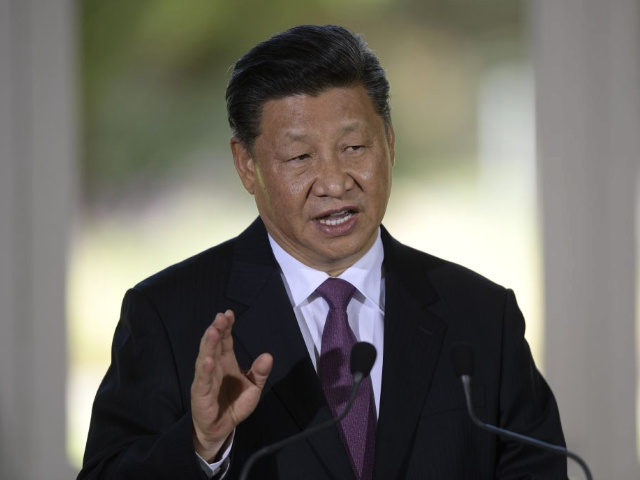Chinese Communist Party leader Xi Jinping on Sunday saluted the 2019 China International Big Data Industry Expo with a congratulatory letter calling for more international cooperation on data security.
It was a bold play given China’s long history of intellectual property theft, its abuse of advanced information technology to power nightmarish surveillance schemes, and concerns about the security of Chinese electronics.
Chinese state media celebrated the growth of China’s digital economy and made no mention of those disturbing questions. China Daily delivered an upbeat report on how China is preparing to become the global leader in online data processing:
The new generation of information technology, represented by the internet, big data and artificial intelligence, is booming at present and has significant and profound influence on various countries’ economic development, social progress and people’s lives, Xi said in the letter.
China attaches great importance to the development of the big data industry and is willing to share opportunities of the digital economy’s development with other countries and jointly explore new growth drivers and development paths by exploring new technologies, new business forms and new models, Xi added.
With increasingly wider applications of digital technologies in China, the country is expected to generate and store 27.8 percent of global online data by 2025, up from 23.4 percent last year, according to a report by market researcher International Data Corp and data storage firm Seagate.
In comparison, the US share will stand at 17.5 percent by 2025, a drop from its 21 percent share in 2018, the report added.
China Daily cited a glowing endorsement for the concept of “cyber sovereignty,” sold with a great deal of aspirational language about global connectivity but boiling down to authoritarian states telling the free world to keep quiet about human rights instead of using the Internet to promote its subversive notions of freedom:
Paul Romer, co-recipient of the 2018 Nobel Prize in economics and professor of economics at New York University, said he is impressed by China’s proposal in cyber sovereignty which he understands as: Each nation must be able to write and enforce its own laws that regulate cyberspace, and ensure that cyberspace works to the benefit of everyone in the nation.
“China’s articulation and implementation of cyber sovereignty means it is a chance for the world to see a different kind of organization for cyberspace, and a chance to see that with the right structure, we can get tons of benefits,” Romer added.
The Chinese Communist Party’s Global Times published a similarly upbeat report on the surging digital economy, coupled with similar warnings to foreign governments and corporations that they had better forget about pressuring China to relent on its tyrannical ways if they wanted a piece of the growing Chinese data market:
China’s digital economy has great growth potential in the global context. The country’s digital economy ranked second in the world in terms of competitive competence in 2018, followed by South Korea, Singapore and Japan, according to a report jointly released by the Tencent Research Institute and Renmin University of China on May 13. The US ranked first, the report said.
The Chinese tech sector has been under pressure as the US continues to escalate the trade war with China and has made the technology sector a battleground by blacklisting Chinese telecom company Huawei. US officials are also reportedly considering blacklisting as many as five Chinese video surveillance companies.
Tech firm representatives told the Global Times on the sidelines of the expo that they were able to withstand the external pressure.
“We have confidence in our ability for research, development and innovation as well as the progress China has made in such sectors like AI and 5G,” Liao Wang, CEO of Atoshi, a Beijing-based firm focusing on blockchain technology, told the Global Times on Sunday.
No country can exclude others to pursue technology growth, Liao noted.
The Global Times noted poverty has been greatly alleviated in the Guizhou region by the Big Data explosion because Guizhou was formerly seen as remote and isolated, but now it offers a cool climate, a hefty power grid, and minimal risk of earthquake damage to data farms. Thanks to those advantages, Guizhou now styles itself as “Big Data Valley,” an answer to Silicon Valley in the United States.

COMMENTS
Please let us know if you're having issues with commenting.